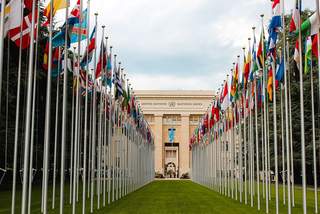
© Unsplash/Mat Reding
Multilateralism is Back: New Impetus for Global Climate Diplomacy?
With the 2016 presidential election, the United States, one of the largest CO2 emitters, retired from international climate protection efforts. While Barack Obama in 2015 was still helping to make the Paris climate agreement a success, the United States officially withdrew from the agreement in 2020. Although some U.S. states, unimpressed by Washington, remained committed to climate protection, the Trump administration retreated to an observer role
Climate Protection Requires International Cooperation
Joe Biden’s climate and energy policy goals are very ambitious. He wants to transform the energy sector towards climate-neutrality until 2035. To achieve this, he wants to rely more on nuclear power and carbon capture and use, as well as carbon capture and storage. This approach opens up new perspectives for climate protection, even if viewed critically in Germany and would not find social acceptance here. However, the availability of climate-neutral energy sources will be decisive for achieving the climate targets. After the United States became a net exporter of fossil fuels under the Trump administration, Biden’s new approach could lead to the export of climate-neutral energy sources within the next ten years. For Europe, the United States could thus become an important player in the development of international markets for renewable energy.
Climate protection is a global task that can only succeed through international cooperation. Isolation is more expensive and inefficient than joint efforts. However, this applies not only to the United States but also to the EU. With its Green Deal and the EU climate law, the EU is relying solely on a European climate policy. The attempt to achieve climate targets in Europe alone, for example through border adjustment mechanisms, makes no sense – neither ecologically, nor economically, nor in terms of cross-border cooperation (or international cooperation). Both an “America First” policy and an “EU First” climate policy would be more expensive and inefficient than a global approach. Instead, the EU should join forces with Joe Biden and the transatlantic partners should return to multilateralism and diplomacy in climate protection together. With the future Ambassador to the United Nations, Linda Thomas-Greenfield, and the new Special Presidential Envoy for Climate, John Kerry, Biden sends a strong signal: Climate protection needs us all.
The Future Course of U.S. Climate Policy: Much Depends on the Senate
The January runoff elections for two U.S. Senate seats in Georgia will largely determine the extent to which Joe Biden's ambitious climate policy agenda can be implemented. These elections will decide whether the U.S. Senate will become half-Democratic and half-Republican, or whether the Republicans will keep their majority. It therefore remains to be seen what course the newly elected president can follow. One thing is certain, however: Multilateralism is back. Diplomacy is back. And that is a positive thing for climate protection.



